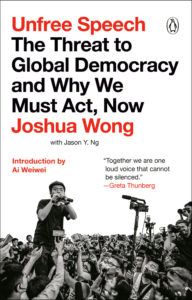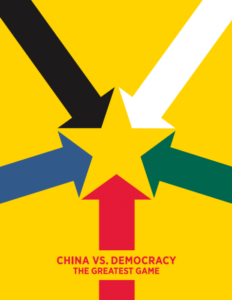China is one of several authoritarian regimes “increasingly acting in concert,” according to a leading international human rights lawyer.
China’s Xi Jinping, Iran’s Ali Khamenei, Venezuela’s Nicolás Maduro, Russia’s Vladimir Putin and Saudi Arabia’s Mohammed bin Salman are the world’s primary authoritarian leaders, said Irwin Cotler, who chairs the Raoul Wallenberg Centre for Human Rights.
“You have China and Russia, for example, supporting Maduro in Venezuela. They now have their almost authoritarian alliance,” he said.
 Beijing’s threat to the West comprises “a significant part” of a new report on the future of NATO, which recommends setting up a consultative body to coordinate Western policy toward Beijing and to highlight Chinese activities that could affect Western security. Those include issues like spying, supply chains, information warfare and arms buildups, the Times reports.
Beijing’s threat to the West comprises “a significant part” of a new report on the future of NATO, which recommends setting up a consultative body to coordinate Western policy toward Beijing and to highlight Chinese activities that could affect Western security. Those include issues like spying, supply chains, information warfare and arms buildups, the Times reports.
With its technological ambitions, military expansion and trade policies, China can no longer be seen as simply an Asian player, the report argues, adding that NATO has been slow to respond to the challenge.
China and Russia have a head start in the race to offer coronavirus vaccine options for mass distribution in developing countries. A Washington Post report looks at how the two countries are using their vaccines to expand their political and economic influence globally.* Washington Post foreign affairs reporter Emily Rauhala joined CBSN to discuss (above).
The “absurdly heavy sentencing” of Hong Kong democracy advocates Joshua Wong, Agnes Chow and Ivan Lam has put the “independence of the judiciary system” further in doubt, said another prominent dissident, Nathan Law, who fled to the U.K. shortly after the new national security law was imposed, CBS reports.
 “It shows that the court once again become the suppression tool in favor to the authorities and the authority is determined to imprison prominent activists to set an example,” Law said on a WhatsApp messaging group used by the pro-democracy movement.
“It shows that the court once again become the suppression tool in favor to the authorities and the authority is determined to imprison prominent activists to set an example,” Law said on a WhatsApp messaging group used by the pro-democracy movement.
“I hope the international community could voice against this unjust sentencing and demand immediate release of the trio,” he said. “We all have to stick to our roles and resist. It’s time to speak up for Hong Kong more actively.”
If the world does not act resolutely to build a stronger alliance against the Chinese Communist Party’s increasing aggression, more activists will be sacrificed, and more essential democratic values, too, argue pro-democracy activists Nathan Law Kwun Chung (@nathanlawkc) and Alex Chow (@alexchow18). Hong Kong is at the front lines of the resistance against Beijing’s authoritarianism; what happens there should matter to anyone anywhere who cares about the future of freedom, especially since Beijing is trying to export its high-tech, repressive ways to the world, they write for the Times.
More than 200 parliamentarians from 19 different countries are drinking Australian wine to “stand against authoritarian bullying” in response to brutal trade tariffs slapped on the country by China amid an escalating diplomatic standoff, the Guardian reports.
 Overnight, members of the Inter-Parliamentary Alliance on China (IPAC), a group comprising more than 200 MPs from 19 different countries which aims to achieve “reform on how democratic countries approach China”, launched a campaign to encourage people to drink Australian wine in December, it adds.
Overnight, members of the Inter-Parliamentary Alliance on China (IPAC), a group comprising more than 200 MPs from 19 different countries which aims to achieve “reform on how democratic countries approach China”, launched a campaign to encourage people to drink Australian wine in December, it adds.
The nature of soft power in international affairs is evolving. There is a crying need to reinvent government-funded international broadcast media, given the changes not only in soft power but in the nature of information warfare and influence operations in the world today, argues MEMRI’s Alberto M. Fernandez:
What we are seeing in the world today is that America’s authoritarian adversaries – China, Russia, authoritarian regimes in the Muslim world like Iran and Turkey, jihadi terrorists, and Islamist ideologues – have learned to effectively weaponize the tools and stances of new media and of the cynical worldview that epitomizes much of the Western chattering elite, turning these tools and narratives against us.
*A new policy paper by Ana Krstinovska deals with the growing issue of pro-China narratives in Europe, using the case study of North Macedonia, China Observers in Central and Eastern Europe (CHOICE) reports. With the COVID-19 crisis serving as a significant catalyst, these campaigns have ramped up as China attempts to retroactively “retell” the tale of the epidemic’s origin and paint itself as the hero rather than the villain, emphasize China’s success in handling the pandemic in comparison with the Western countries, and exaggerate the assistance it provides through expertise and donations.

 Beijing’s threat to the West comprises “a significant part” of a new report on the future of NATO, which recommends setting up a consultative body to coordinate Western policy toward Beijing and to highlight Chinese activities that could affect Western security. Those include issues like spying, supply chains, information warfare and arms buildups,
Beijing’s threat to the West comprises “a significant part” of a new report on the future of NATO, which recommends setting up a consultative body to coordinate Western policy toward Beijing and to highlight Chinese activities that could affect Western security. Those include issues like spying, supply chains, information warfare and arms buildups,  “It shows that the court once again become the suppression tool in favor to the authorities and the authority is determined to imprison prominent activists to set an example,” Law said on a WhatsApp messaging group used by the pro-democracy movement.
“It shows that the court once again become the suppression tool in favor to the authorities and the authority is determined to imprison prominent activists to set an example,” Law said on a WhatsApp messaging group used by the pro-democracy movement. Overnight, members of the Inter-Parliamentary Alliance on China (IPAC), a group comprising more than 200 MPs from 19 different countries which aims to achieve “
Overnight, members of the Inter-Parliamentary Alliance on China (IPAC), a group comprising more than 200 MPs from 19 different countries which aims to achieve “





